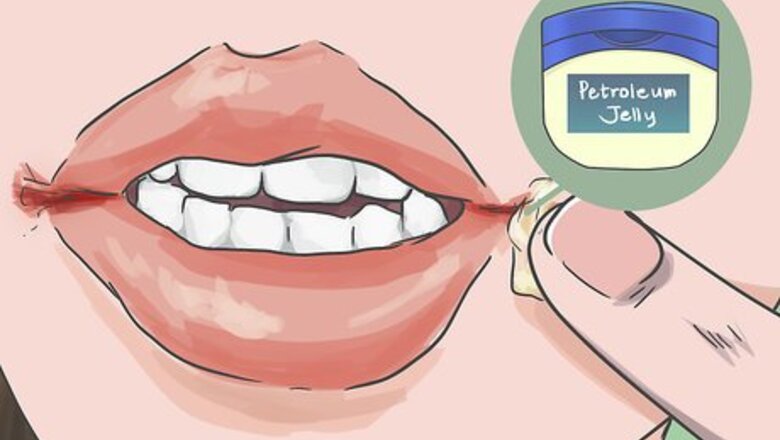
views
Using At-Home Topical Treatments
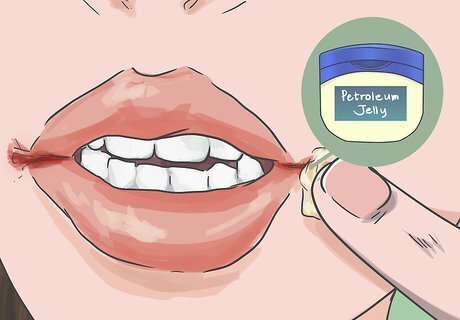
Use petroleum jelly to heal and soothe your cracked mouth. Using a clean, new container of petroleum jelly to avoid germs, rub a small amount on the cracks in the corners of your mouth as often as needed. Petroleum jelly forms a barrier between your skin and saliva, keeping your mouth safe from excess moisture and later, extreme drying. There is no hard and fast rule about how much and how often you can and should apply petroleum jelly to your cracked mouth. To start, though, apply a finger-sized dab and use as often as you would use any chapstick. While allergies are possible but rare, petroleum jelly is generally safe to use regardless of your underlying cause or condition, making it a great option for anyone dealing with cracks in the corners of their mouth.
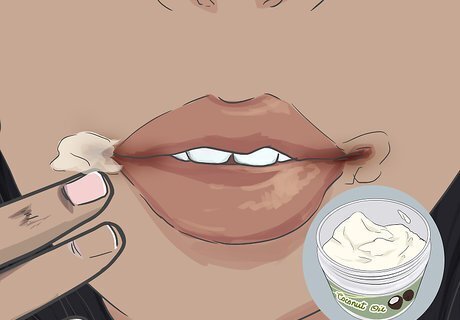
Rub coconut oil on the cracked area to hydrate your skin. Apply a finger-sized dab of either liquid or solid coconut oil to the cracks on your mouth. Like petroleum jelly, using coconut oil is an inexpensive way to help heal the cracks in the corners of your mouth. Coconut oil is generally safe to use as often as needed to help heal the cracks in the corners of your mouth. If you have oily or acne-prone skin, try to limit the application of coconut oil to just the cracked skin. Coconut oil may clog pores and cause breakouts.
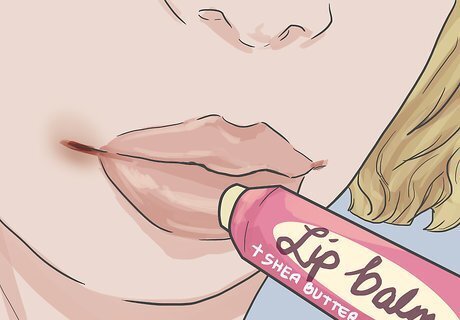
Get a lip balm containing vitamin E and/or shea butter. When choosing a lip balm to help heal and soothe the cracks in the corners of your mouth, focus on finding a balm with vitamin E, shea butter, or, preferably, both. Both vitamin E and shea butter are popular lip balm ingredients, and with good reason – these are highly moisturizing ingredients that can also act as healing agents when your lips are cracked. Like petroleum jelly and coconut oil, shea butter helps form a barrier between saliva and your skin. Vitamin E can help prevent and soothe cracking. It can also help protect your skin from the sun, which can make the cracks in the corners of your mouth worse. Use a lip balm that has 15 SPF or higher to help protect your skin from UV damage.
Healing with Dietary Changes
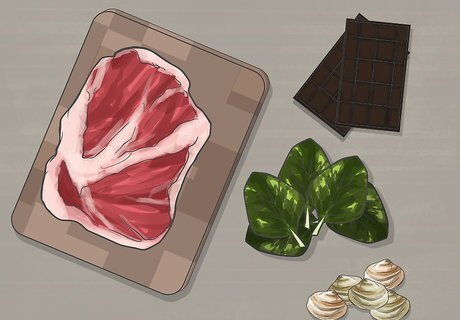
Introduce more iron-rich foods into your diet. One of the common underlying conditions that can cause cracks in the corners of your mouth is an iron deficiency. By introducing more iron into your diet, you may be able to help the cracks in the corners of your mouth heal faster, as well as prevent them in the future. While it can vary from one person to another, in general, the recommended daily intake of iron is 18 mg. Foods that are rich in iron include shellfish, spinach, legumes, red meat, pumpkin seeds, quinoa, turkey, broccoli, and dark chocolate.
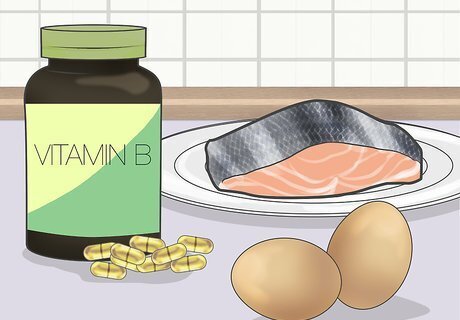
Incorporate foods containing vitamin B into your diet. If you have cracks in the corners of your mouth, incorporating more vitamin B rich foods can help your skin heal and fight any underlying infection. Vitamin B plays a vital role in both helping your body fight infections and keeping your skin healthy, both of which can cause the sides of your mouth to crack. There are 8 B vitamins, including B-1, B-2, B-3, B-5, B-6, biotin, folic acid, and B-12. The recommended daily intake varies based on the vitamin and your individual needs. Therefore, it is best to vary your diet and incorporate foods that are rich in multiple B vitamins. A few examples of foods that are rich in various B vitamins are salmon (B-1, B-2, B-3, B-5, B-6, B-12), eggs (B-2, B-5, biotin, folic acid, and B-12), and nutritional yeast (B-1, B-2, B-3, B-5, B-6, folic acid, and B-12).
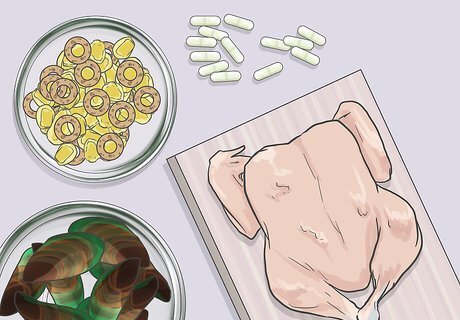
Include more zinc in your daily meals. Zinc deficiencies can lead to cracking in the corner of your mouth, so it’s important to incorporate it into your diet. Aim to have about 11 mg of zinc daily if you’re male and 8 mg if you’re female so you can stay healthy. Eat foods like fortified cereals, beef, shellfish, and chicken since they’re all good sources of the mineral. You can also take zinc supplements if you aren’t able to reach your daily recommended intake.
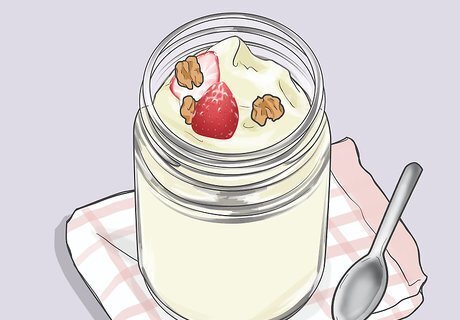
Eat yogurt in case your cracked mouth is caused by an infection. One of the most common causes of the cracks in the corners of your mouth is an infection. While only your doctor can fully determine if you have an infection and what type of infection you have, you can start healing the infection and the cracks in the corners of your mouth by eating 4 teaspoons (20 mL) of yogurt daily. Yogurt can help treat both yeast infections, as well as bacterial infections. Look for yogurt that contains live active cultures, such as the probiotic lactobacillus acidophilus.
Getting Treatment from a Doctor
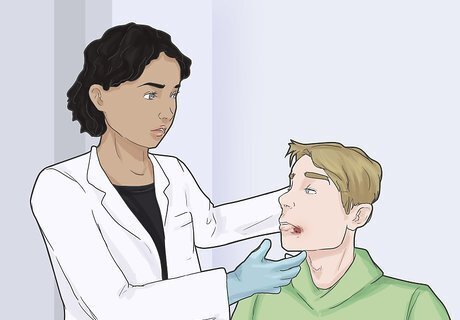
See a doctor for severe symptoms or if home treatments don't work. If the cracks in the corners of your mouth do not start to get better within 1 week, or if you have severe symptoms such as burning, extreme lip pain, or red or purple spots around your mouth, contact your doctor to make an appointment. While cracks in the corners of your mouth can often be treated at home, this is not always the case. Your doctor can diagnose any underlying symptoms that you may have and help you effectively treat the cracks in the corners of your mouth.
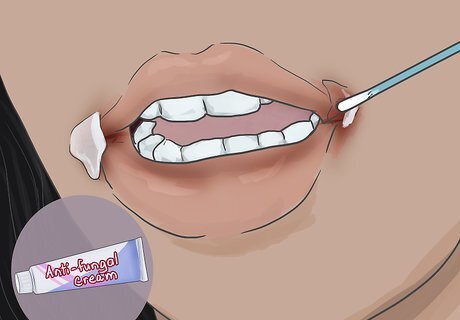
Try an anti-fungal cream if your cracked mouth is caused by yeast. If your doctor determines that the cracks in the corners of your mouth are caused by a yeast infection, they will likely prescribe an anti-fungal cream, or recommend an over-the-counter option. How much and how often you should apply anti-fungal creams will depend on the severity of your condition, as well as the type of cream. Therefore, make sure that you follow the directions on the label or any specific instructions given to you by your doctor. In most cases, your doctor will recommend an anti-fungal cream that contains ketoconazole, an active ingredient that is particularly helpful for oral fungal infections.
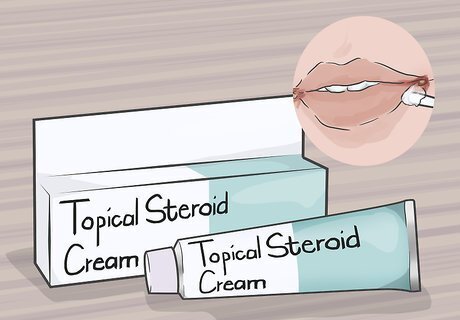
Get a topical steroid cream if you have a bacterial infection. If the cracks in the corners of your mouth are caused by a bacterial infection, your doctor may recommend a topical steroid cream. If the infection is severe, your doctor may give you a prescription for a steroid cream. For less severe cases, your doctor will likely recommend an over-the-counter hydrocortisone steroid cream. When you apply a topical steroid cream, make sure that you follow your doctor’s instructions. Nicholas Perricone Nicholas Perricone, Dermatologist For painful cracks and irritation at the corners of the mouth, apply a thin layer of hydrocortisone cream after gently cleansing with hypoallergenic cleanser. The hydrocortisone reduces inflammation while nourishing ingredients like vitamin E, rose hip seed oil, and shea butter promote healing. Avoid picking or pulling at the delicate skin which can worsen cracks. With a gentle regimen, most angular cheilitis resolves within 1-2 weeks.
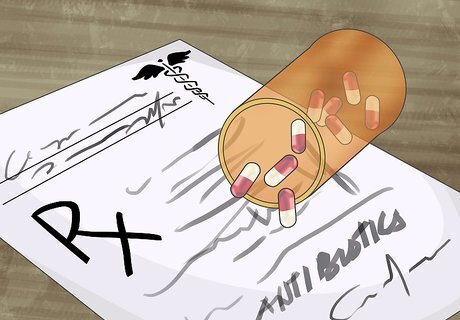
Get a prescription for antibiotics if the cause is a bacterial infection. If the cracks in the corners of your mouth are caused by a bacterial infection and topical treatments have been ineffectual for over a week, your doctor will likely prescribe you with an oral antibiotic. The type of antibiotic, as well as how often you should take the medication, will vary depending on your underlying condition, so make sure you follow you the instructions on the medication. Antibiotics can cause some side effects, such as a rash, dizziness, nausea, diarrhea, or yeast infection. If you get any of these side effects, contact your doctor.
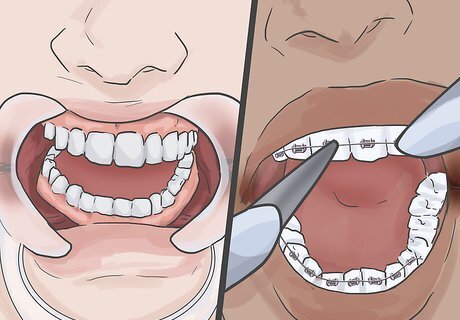
Have your dentures or braces refitted. If you have dentures, braces, or any other oral prosthesis that is causing you to produce excess saliva, ask your doctor or dentist about having it refitted. Having an ill-fitting dental piece in your mouth can cause excess saliva to linger in the corners of your mouth, resulting in dryness and cracking once the saliva is removed. Your dentist should be able to refit your dental piece so that it is comfortable and allows your symptoms to subside. Excess saliva often occurs when dental pieces, such as dentures, loosen over time. To help avoid this, make sure that you get the fit of your dental piece checked at least once a year.

Ask your doctor to check for underlying conditions. People with diabetes or a weakened immune system due to illness are more likely to get a dry, cracked mouth. If you get cracks in the corners of your mouth often, and/or common treatments do not work very well, ask your doctor to test you for an underlying condition.




















Comments
0 comment